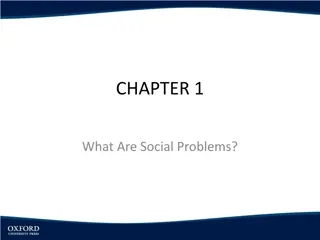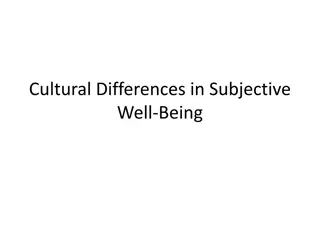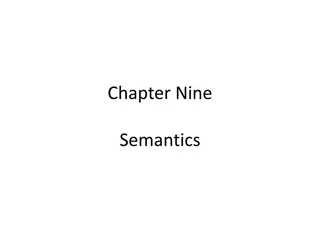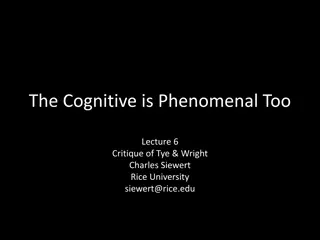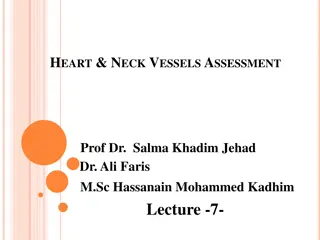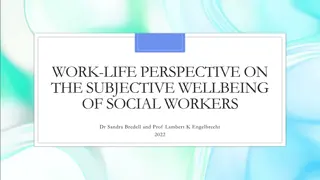Documentation Strategies for Patient Progress in SOAP Notes
Common format for SOAP Notes documentation includes Subjective, Objective, Assessment, and Plan sections. Subjective notes involve patient information and history, while Objective notes detail examination findings. Effective documentation strategies include organization, use of active verbs, and dir
2 views • 33 slides
Understanding Relativism and its Impact on Critical Thinking
Relativism poses a challenge to critical thinking by asserting that truth is subjective and varies from person to person or society to society. While some forms of relativism, like relativity, can be rational, global relativism faces self-referential inconsistency. Values relativism is commonly appl
0 views • 25 slides
Organometallic Compounds of Group 2 Elements
In the realm of organometallic chemistry, Group 2 elements, specifically alkaline earth metals like beryllium and magnesium, exhibit intriguing properties and reactivities. The chemistry of these elements, mimicking that of Group 12 elements in many aspects, leads to the formation of various organom
5 views • 27 slides
Understanding Medical Word Elements: Roots, Combining Forms, Suffixes, and Prefixes
Medical terminology uses word elements like roots, combining forms, suffixes, and prefixes. Word roots provide the main meaning, combining forms connect elements, suffixes modify word meaning, and prefixes are placed at the beginning of words. Examples illustrate how these elements are used in medic
5 views • 13 slides
Geology of the Earth
The evolution of elements in the universe began with the Big Bang, leading to the formation of hydrogen, helium, and heavier elements through stellar processes like fusion and supernovae. Our solar system formed 4.5 billion years ago from a nebula containing a variety of elements. These elements pla
4 views • 44 slides
Understanding the Periodic Table and Chemical Bonds in Physical Science
The periodic table organizes elements based on their properties, with rows representing periods and columns representing groups. Mendeleev's early table laid the foundation for predicting undiscovered elements. Today's periodic table orders elements by atomic number, showcasing the periodic law and
3 views • 15 slides
Understanding Facts and Opinions in Reading Comprehension
Reading comprehension involves distinguishing between facts and opinions in a text. Facts can be objectively proven, while opinions are subjective reflections of personal feelings. Recognizing the difference is crucial for essay writing and critical analysis. By examining cues and asking specific qu
2 views • 9 slides
Understanding the Periodic Table: From Mendeleev to Modern Classification
Organizing elements based on their properties led to the development of the periodic table by Mendeleev with predictions that have stood the test of time. The modern periodic table arranges elements by increasing atomic number, showcasing repeating patterns of properties. It categorizes elements int
1 views • 29 slides
Chemistry of f-Block Elements: Lanthanide and Actinide Series Overview
This segment delves into the properties, occurrence, and unique characteristics of the f-block elements, focusing on the Lanthanide and Actinide series. Covering topics such as color, oxidation states, spectral properties, lanthanide contraction, separation methods, and industrial applications of th
1 views • 15 slides
Understanding Social Problems: A Sociological Perspective
Social problems are conditions or behaviors that cause public concern and require collective action. Sociology, particularly in the study of social issues, aims to identify both objective elements like measurable harm and subjective elements like moral evaluations. These subjective beliefs can shape
0 views • 34 slides
Understanding the Key Elements of Tourism
Elements of tourism encompass crucial factors like pleasing weather, scenic attractions, historic and cultural sites, accessibility, amenities, and accommodation. These elements form the foundation of tourism activities worldwide, attracting visitors to destinations globally. From beautiful landscap
1 views • 13 slides
Comprehensive Overview of Problem-Oriented Medical System in Physiotherapy Assessment
In the realm of physiotherapy assessment, the Problem-Oriented Medical System (POMS) plays a vital role in accurately defining patient problems, creating treatment plans, and monitoring progress. This system, pioneered by Weed in 1968, consists of Problem-Oriented Medical Records (POMR), auditing, a
2 views • 34 slides
Understanding the Importance of Positive Psychology and Subjective Well-Being
Positive psychology emphasizes the significance of happiness, satisfaction, and well-being in people's lives. Subjective well-being (SWB) focuses on individuals' evaluations and feelings about their lives rather than just objective conditions. Enhancing SWB is not only about feeling better but also
1 views • 48 slides
Cultural Contrasts in Subjective Well-Being: Factors and Values
Societies exhibit varying levels of well-being influenced by factors such as wealth, stability, and culture. Economic development, social stability, and individualist-collectivist values play crucial roles. Broad socioeconomic indicators like GDP and life expectancy impact well-being significantly.
1 views • 49 slides
Essential Elements for Plant Growth: A Comprehensive Nutritional Guide
Plants require essential elements for normal growth and development, with 16 key elements identified as crucial. Macronutrients and micronutrients play vital roles in plant metabolism, with specific criteria determining the essentiality of each element. Understanding the diverse functions of these e
2 views • 17 slides
Objectivity, Value Judgement, and Theory Choice in Science
Thomas Kuhn's work explores the subjective elements in theory choice, highlighting that theory selection is not solely based on objective algorithms. He discusses the structure of scientific revolutions, where science shifts between normal and revolutionary phases. Kuhn's ideas have faced criticisms
6 views • 19 slides
IEEE 802.11-20/0772r2 Multi-Link Elements Overview
IEEE 802.11-20/0772r2 discusses various aspects of multi-link elements in the context of IEEE 802.11 standards. The document covers the need for efficient element ID extension, different multi-link element structures, including authentication algorithms, common controls, and sub-elements organizatio
1 views • 10 slides
Evolution of Periodic Table and Classification of Elements
The Periodic Table is a systematic arrangement of elements based on atomic number and properties. Over time, chemists developed various classification methods such as Dobereiner's Triads, Newland's Law of Octaves, Mendeleev's Periodic Table, and the Modern Periodic Table to organize the increasing n
1 views • 26 slides
Elements of Social Action: Understanding Human Behavior in Society
Social action plays a vital role in analyzing human behavior within a society. Max Weber's concept emphasizes how actions influence and are influenced by others, holding subjective meanings. Talcott Parsons outlined five components: actor, objective, social situation, normative orientation, and ener
0 views • 9 slides
Group Decision-Making: The Wisdom of Crowds and Stupidity of Herds
This presentation by Richard Zeckhauser of Harvard University delves into the importance of rational analysis and subjective probability in group decision-making processes. It emphasizes the need to focus on collective wisdom while avoiding biases that can affect group decisions. Key concepts covere
2 views • 22 slides
Police Powers & Sniffer Dogs: Legislative Basis and Procedures
This presentation covers the legislative framework, case law, and operational procedures related to police powers and the use of sniffer dogs in detecting drug offences. It discusses the authority granted to police officers for search and detainment, the subjective and objective elements required fo
0 views • 14 slides
D-Block Elements: Properties and Classification in Chemistry
Welcome to the Department of Chemistry at Kisan Veer Mahavidyalaya, Wai. Explore the Chemistry of Elements of the 3d series, focusing on d-Block Elements and Transition Elements. Learn about their electronic structure, colored ions, magnetic properties, oxidation states, and complex formation. Under
0 views • 34 slides
Understanding Nationalism in Political Science
Nationalism, a complex concept, defines the nation as the fundamental unit of political rule. It encompasses a mix of objective and subjective factors, including cultural, ethnic, and political traits. The definition of a nation is subjective, based on how its members perceive themselves as a distin
0 views • 27 slides
Effectiveness of Psychological Intervention in Managing Stress and Depression Among Cancer Patients
A study was conducted to assess the effectiveness of a psychological intervention program in managing stress, depression, and subjective well-being among cancer patients. The study involved 132 cancer patients aged 35 to 65 years, with 72 patients in the experimental group receiving psychological in
1 views • 48 slides
QBism and Convivial Solipsism in Quantum Interpretations
QBism and Convivial Solipsism present different interpretations of quantum mechanics, focusing on the subjective nature of probabilities and experiences within the quantum formalism. QBism emphasizes the subjective interpretation of probability, considering the quantum state as a tool for assigning
0 views • 30 slides
Exploring EFL Teachers' Subjective Theories on Pronunciation Training
This study delves into EFL teachers' subjective theories regarding pronunciation training, with a focus on Internet-supported practices. Through semi-structured interviews, 11 high school EFL teachers shared their views and attitudes on the importance of pronunciation training in EFL classrooms, as
0 views • 13 slides
Comprehensive Guide to Abdominal Assessment for Healthcare Professionals
This lecture by Hassanain Mohammed Kadhim covers the essential techniques and subjective data needed for a thorough abdominal assessment. It includes objectives, equipment required, preparation steps, subjective data collection, inspection guidelines, abdominal landmarks, common causes of abdominal
0 views • 21 slides
Semantic Data Model of Electronic Invoicing Core Elements
Presentation by Fred van Blommestein on the EN16931-1 semantic data model of core elements in electronic invoicing, covering invoice processes, core invoice design, semantic model details, business rules, and invoicing principles. The model includes 160 elements in 33 groups, with mandatory elements
0 views • 13 slides
Comparative Analysis of Institutionalization and Subjective Wellbeing in Europe
This study explores the impact of institutionalization on subjective wellbeing in Europe, comparing private homes and nursing homes. The research examines the desire to avoid nursing homes, especially heightened by the COVID-19 pandemic, and investigates the wellbeing of older Europeans in different
0 views • 14 slides
Causal Effects of Health on Retirement Using Subjective Conditional Expectations
This research explores the impact of health on retirement decisions by analyzing subjective conditional expectations of older workers. By studying the relationship between health, work, and retirement planning, the study aims to provide insights into policy implications for ensuring the future solve
0 views • 19 slides
Exploring the World of Matter and Elements
Matter is the physical "stuff" of the universe, encompassing elements that make up rocks, wood, air, metals, water, and living organisms. Chemical elements are the building blocks of matter, with essential elements like oxygen, carbon, hydrogen, and nitrogen constituting a significant part of living
0 views • 24 slides
Understanding Key Concepts of Insurance
Key notions of insurance include fortuitous loss, risk occurrence, loss exposure, objective and subjective risk, and the law of large numbers to predict future loss experience. Objective risk is based on actual loss variation, while subjective risk is based on individual perception. Understanding th
0 views • 26 slides
Exploring Semantics: Meaning of Words and Concepts
Semantics is the study of the meaning of words, ranging from their basic literal components to their associative connotations. This branch of linguistics focuses on objective meaning shared by all rather than subjective interpretations. Concepts like conceptual and associative meanings are explained
0 views • 22 slides
Exploring Phenomenal Consciousness: Reducibility, Variation, and Cognitive Phenomenology
Delve into the rich realm of phenomenal consciousness, dissecting the interplay between sensory and conceptual elements. Contemplate the essence of cognitive activity, sensory features, and the potential inclusion of non-sensory aspects within consciousness. As you ponder reducibility, variation, an
0 views • 28 slides
Understanding S-Block Elements in the Periodic Table
The s-block elements in the Periodic Table consist of 14 elements with unique properties and characteristics. Lithium, sodium, and potassium are notable members of Group 1, characterized by their reactivity and ability to form alkaline solutions when in contact with water. These soft metals exhibit
0 views • 23 slides
Heart and Neck Vessels Assessment Overview
This information presents a comprehensive guide for heart and neck vessels assessment, including objectives, necessary equipment, preparation steps, subjective data to consider, techniques for palpating and auscultating the carotid artery, normal findings, and more. It emphasizes the importance of s
0 views • 23 slides
Understanding German Criminal Fraud Law in the Context of the Corona Pandemic
Explore the intricacies of German criminal fraud law, particularly in the current Corona pandemic situation. Delve into the objective and subjective elements of the offense, characteristics of fraud, and subsidy fraud, along with detailed discussions on deception, error, disposition of property, and
0 views • 17 slides
Cognitive Study of Subjectivity Extraction in Sentiment Annotation
A cognitive study on extracting subjectivity in sentiment annotation, exploring if humans perform subjective extraction similarly to machines for sentiment analysis. The study investigates sentiment oscillations and different methods adopted based on the nature of subjective documents.
0 views • 14 slides
Aerobic Gymnastics Competition Guidelines and Rules
The guidelines for aerobic gymnastics competitions include compulsory elements, categories, competition spaces, deductions, and specific rules for different age groups. The competitions have specific parameters for elements allowed, lifting, floor elements, music length, maximum difficulty elements,
0 views • 17 slides
Understanding Subjective Wellbeing of Social Workers in South Africa
Gain insights into the subjective wellbeing of social workers in South Africa within the context of work-life balance. Explore perceptions of work-life balance and subjective wellbeing, aiming to provide recommendations for improving the overall wellbeing of social workers. The study uses theoretica
0 views • 24 slides









